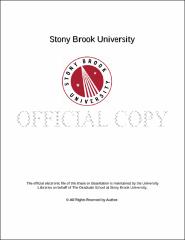| dc.identifier.uri | http://hdl.handle.net/11401/77110 | |
| dc.description.sponsorship | This work is sponsored by the Stony Brook University Graduate School in compliance with the requirements for completion of degree. | en_US |
| dc.format | Monograph | |
| dc.format.medium | Electronic Resource | en_US |
| dc.language.iso | en_US | |
| dc.publisher | The Graduate School, Stony Brook University: Stony Brook, NY. | |
| dc.type | Dissertation | |
| dcterms.abstract | Since the publication of Hamilton’s (1989) seminal work on Markov switching model, a large number of applications have been found in economics and finance. The classical Markov switching models characterize the estimation of parameters in finite state, limited by the pre-specified number of regimes, thus it is restrictive in empirical studies. In this thesis, we develop a stochastic regime switching model, where the model parameters are both categorical and continuous. By assuming conjugate priors and defining stochastic regime switching variables, we derive recursive filtering and smoothing algorithms to estimate the regimes and develop closed-form recursive Bayes estimates of the regression parameters. Moreover, bounded complexity mixture (BCMIX), an approximation scheme, is derived to increase the computation efficiency substantially and yet this method is comparable to the Bayes estimates in statistical efficiency. Hyperparameters are estimated via expectation and maximization procedure and presented in closed form solutions. Intensive simulation studies show that lower order of bounded complexity mixture procedure is as efficient as Bayes estimates and that estimation performs well on moderate large transition probability scenarios. A comparative simulation study shows that classical Markov switching models have a tendency to overestimate the transition probabilities. We used our model to analyze several US economic data, such as unemployment rate, industrial production and manufacturing and trade inventory, to show our model is more suitable than classical regime switching models in analyzing business cycles of economic time series data. | |
| dcterms.abstract | Since the publication of Hamilton’s (1989) seminal work on Markov switching model, a large number of applications have been found in economics and finance. The classical Markov switching models characterize the estimation of parameters in finite state, limited by the pre-specified number of regimes, thus it is restrictive in empirical studies. In this thesis, we develop a stochastic regime switching model, where the model parameters are both categorical and continuous. By assuming conjugate priors and defining stochastic regime switching variables, we derive recursive filtering and smoothing algorithms to estimate the regimes and develop closed-form recursive Bayes estimates of the regression parameters. Moreover, bounded complexity mixture (BCMIX), an approximation scheme, is derived to increase the computation efficiency substantially and yet this method is comparable to the Bayes estimates in statistical efficiency. Hyperparameters are estimated via expectation and maximization procedure and presented in closed form solutions. Intensive simulation studies show that lower order of bounded complexity mixture procedure is as efficient as Bayes estimates and that estimation performs well on moderate large transition probability scenarios. A comparative simulation study shows that classical Markov switching models have a tendency to overestimate the transition probabilities. We used our model to analyze several US economic data, such as unemployment rate, industrial production and manufacturing and trade inventory, to show our model is more suitable than classical regime switching models in analyzing business cycles of economic time series data. | |
| dcterms.available | 2017-09-20T16:51:59Z | |
| dcterms.contributor | Xing, Haipeng | en_US |
| dcterms.contributor | Kuan, Peifen | en_US |
| dcterms.contributor | Zhu, Wei. | en_US |
| dcterms.creator | Dong, Xiaojin | |
| dcterms.dateAccepted | 2017-09-20T16:51:59Z | |
| dcterms.dateSubmitted | 2017-09-20T16:51:59Z | |
| dcterms.description | Department of Applied Mathematics and Statistics | en_US |
| dcterms.extent | 214 pg. | en_US |
| dcterms.format | Monograph | |
| dcterms.format | Application/PDF | en_US |
| dcterms.identifier | http://hdl.handle.net/11401/77110 | |
| dcterms.issued | 2016-12-01 | |
| dcterms.language | en_US | |
| dcterms.provenance | Made available in DSpace on 2017-09-20T16:51:59Z (GMT). No. of bitstreams: 1
Dong_grad.sunysb_0771E_12773.pdf: 2628219 bytes, checksum: c0620614644505243ac9739df8677d25 (MD5)
Previous issue date: 1 | en |
| dcterms.publisher | The Graduate School, Stony Brook University: Stony Brook, NY. | |
| dcterms.subject | Statistics -- Applied mathematics | |
| dcterms.subject | Bayesian analysis, BCMIX method, Business cycle, Mixture distributions, Recursive filter/smoother, Stochastic regimes | |
| dcterms.title | A New Stochastic Regime Switching Model with Time-varying Regression Coefficients and Error Variances | |
| dcterms.type | Dissertation | |

